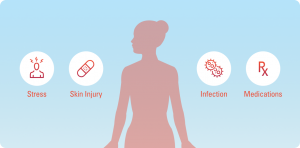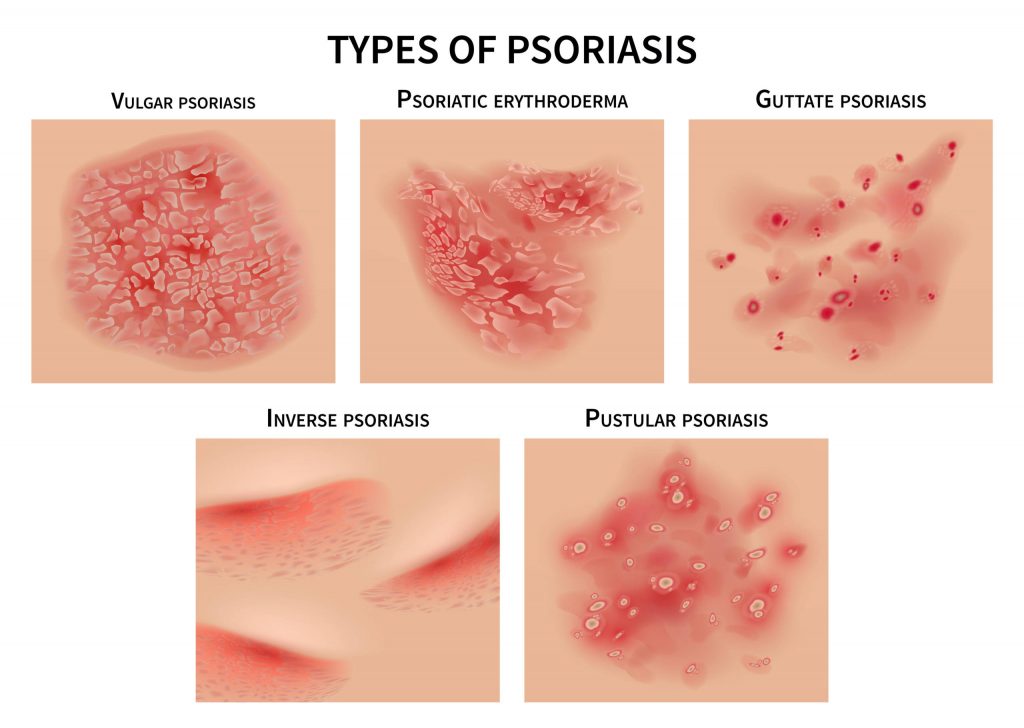
Psoriasis Triggers
Psoriasis is a disorder that is characterized by red, scaly and sometimes itchy growth of skin

Getting a diagnosis like psoriasis can be a bit scary. Everyone seems to understand that it is a skin disease, but beyond that, most people couldn’t tell you anything about psoriasis. And when you get a diagnosis, you want to understand as much as you can about the disease because that is the best way to learn what you can do to best manage it. Below you will find what you need to know about psoriasis.
The first thing that you will want to know is that there are 5 main types of psoriasis.
Plaque psoriasis is the most common type of psoriasis (about 80% of psoriasis cases are plaque psoriasis). You can recognize plaque psoriasis by skin with raised, red spots covered in silvery scales. Plaque psoriasis is usually found on the elbows, lower back, knees and scalp.
This type of psoriasis usually begins when a person is a child or young adult. Guttate psoriasis is characterized by small red spots on the skin that are not as thick as plaque lesions.
Inverse psoriasis shows up as bright-red lesions that appear smooth or shiny and it is usually present in the groin, armpits, under the breasts and in other skin folds.
Pustular psoriasis can be localized to only certain parts of the body, but it can also cover most of the body. Pustular psoriasis is usually only seen in adults and can be identified by red, inflamed skin around white blisters of pus (it is not infectious).
Erythrodermic psoriasis is seen as very red skin covering most of the body and scales that shed in sheets. It is not constant, but happens periodically.
That’s Great, But What Is Psoriasis?
There is a lot of misunderstanding about psoriasis. Many think it is just a skin condition and that it will go away on its own. And while it is true that most of the symptoms of psoriasis will clear up on their own, psoriasis is acutally a chronic immune system disease. Nobody knows what causes psoriasis, but many believe that the immune system begins creating skin cells at a very rapid pace. This can cause itchy, red skin spots covered in thick silvery scales (in plaque psoriasis, the most common type).
Is It Curable?
Unfortunately, psoriasis is not curable. Scientists and doctors are researching and developing better treatment options, but as of now, there is no cure for psoriasis. Psoriasis can, in many cases, go into remission and show no symptoms for very long periods of time with proper treatment.
Is It Contagious?
Thankfully, no psoriasis is not contagious. You do not need to worry about inadvertently spreading the disease to friends or loved ones.
There is no cure for psoriasis, but there are many options when it comes to treatment. Make sure that you read about the different options available to you, and don’t be afraid to try some things that may seem a little bit unconventional. Many people report great success through some of the more unconventional methods and when it comes to a disease like psoriasis, you need to find what works for you and stick to it!

Psoriasis is a disorder that is characterized by red, scaly and sometimes itchy growth of skin
Medical Referral | Accident Attorney Referrals
Filter out the noise and nurture your inbox with health and wellness advice that’s inclusive and rooted in medical expertise.
MedicalReferral.com does not provide medical advice, diagnosis, or treatment.